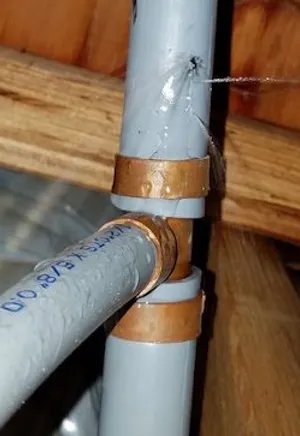Don’t Let Your Plumbing Unleash a Flood of Problems

If your home was constructed between the late 1970s and the mid-1990s, a thorough inspection for Poly-B piping is imperative. During this era, Poly-B piping was widely used in residential plumbing systems due to its affordability and ease of installation. However, the material's susceptibility to premature degradation has led to numerous cases of leaks, bursts, and costly water damage in homes across the country. Identifying whether your home contains Poly-B piping through a professional inspection is essential to safeguarding against potential plumbing catastrophes and ensuring the long-term integrity of your property.
In 1997 Poly B was banned by the National Plumbing Code, which oversaw plumbing trades in Canada. Over time, exposure to common household chemicals, ultraviolet rays, and fluctuations in temperature can weaken the structural integrity of Poly-B pipes. This deterioration leads to an increased risk of leaks, bursts, and costly water damage. Unlike copper piping, which boasts longevity measured in decades, Poly-B pipes often succumb to degradation within a mere fraction of that time.
Moreover, the consequences of Poly-B pipe failure extend far beyond inconvenience and financial strain. Mold infestations, rot, and structural damage resulting from water leaks can compromise the health and safety of occupants, as well as the structural integrity of the home itself. By proactively replacing Poly-B piping, homeowners can mitigate these risks and safeguard their investment.
Professional plumbers possess the specialized knowledge, tools, and experience necessary to execute a seamless pipe replacement. From conducting thorough inspections to selecting suitable replacement materials, their expertise ensures the longevity and reliability of the new plumbing system. Additionally, professional plumbers adhere to industry best practices and local building codes, providing homeowners with peace of mind and assurance that their plumbing meets safety standards.
In essence, entrusting the replacement of Poly-B piping to a professional plumber is a proactive measure that protects both the structural integrity of the home and the well-being of its inhabitants.
It you want to give your home a quick once-over before giving us a call, here’s a handy guide to get you started.
-
Polybutylene (Poly-B) is a type of plastic resin that was used in the manufacturing of pipes between 1978 and 1995. These pipes were popular because they were inexpensive, easy to install, and resistant to corrosion. However, they were later found to be prone to breakage and deterioration due to exposure to chemicals found in water, which has led to various lawsuits and settlements. Identifying polybutylene pipes in your home is crucial, as it will help you avoid potential damages and costly repairs.
-
You are more likely to find polybutylene pipes in specific areas of your home. You should be able to identify polybutylene easily in your piping systems. Some common locations include:
• Main water supply line to your home
• Supply lines to sinks, toilets, and bathtubs/showers
• Pipes in your home’s foundation or crawlspace – Pipes in your attic or basement
• Near your water heater -Vent piping or water meter -
Polybutylene pipes are typically gray, blue or black in color but can also be found in white. They may be marked with the initials ‘PB’ followed by a series of numbers, which indicate the pipe’s diameter. For example, “PB2110” is a common marking to look for.
-
Polybutylene pipes are often connected to other pipes using copper fittings or aluminum fittings. Inspect these connections for signs of deterioration, particularly at elbows, T-joints, and shut-off valves. If these fittings also show wear and corrosion or are with plastic, this may further indicate the presence of polybutylene pipes in your home.
-
If you think you’ve identified polybutylene (poly-B) pipes or are not sure, reach out to Caledonian Plumbing and Heating to request a thorough inspection of your plumbing system. We’ll provide expert advice on whether your pipes need replacement and any other necessary remediation work.



